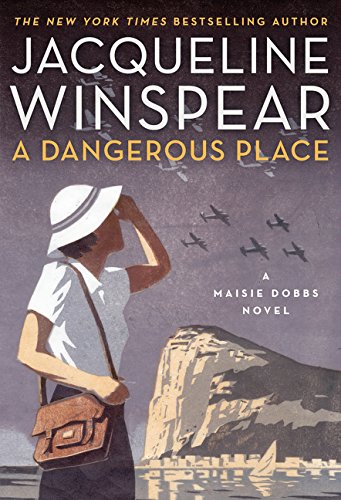Books |
A Dangerous Place
Jacqueline Winspear
By
Published: Mar 10, 2015
Category:
Fiction
GUEST BUTLER NORA LEVINE owns the literary mystery/thriller corner of this site. That’s my good fortune — I can’t read everything — and yours too. Nora introduced us — well, me, anyway — to Tana French and followed up with a review of a second French book. And she started many of you reading the Maisie Dobbs books here. In her real life, she says, “I was a law librarian until it wasn’t so much fun. Now I edit my husband’s briefs (the legal type) in Oakland, California.”
It’s been two years since readers of the Maisie Dobbs series reluctantly finished “Leaving Everything Most Loved.” For fans of the series, those two years feel more like the four that have passed since the close of that novel and the start of this one.
“A Dangerous Place” is a welcome addition to the series. But a spoiler is required, and the spoiler includes sad news. Very sad news. I hate to be the messenger. I don’t want to warn readers away from a very satisfying story.
The opening chapters include letters and reports accounting events in Maisie’s life from 1934-37. Those years were more difficult for her than can be imagined. They started with great promise and ended with even greater heartbreak — heartbreak that permeates the narrative.
As readers of the series know, Maisie’s romantic life was, to put it bluntly, challenged. Her first and great love, Simon, a surgeon she met while a nurse on the front in France during World War I, was permanently injured in a bombing; he was never conscious of the visits Maisie made to him in hospital for years after the war. After Simon’s death the friendship she and James Compton, son of the family who educated her, gradually developed into a romance. It took many years (and many novels) for her to say yes to one of his multiple proposals.
As Maisie looked forward to a fresh start together in Canada, her readers looked forward to the wedding. But fairytale weddings don’t guarantee fairytale lives, and the marriage is tragically brief. As this novel opens, family and friends’ letters describe Maisie’s state of mind after the loss of James and the certain future of marriage. Their letters acknowledge her grief and offer comfort, but they don’t convince Maisie to return home to accept their embrace. [To buy the book from Amazon, click here. For the Kindle edition, click here.]
After leaving the home she and James briefly shared in Canada, she moved to Boston and then India. As this book begins, Maisie is finally en route back to England, but with her destination nearing she knows she cannot remain aboard the Southampton-bound ship. For her part, though she had sent word that she was returning to England, every mile closer to her destination, and at every port along the route, Maisie’s sense of dread had grown. It was akin to sickness, a fear that she could not bear to step onto home soil. And when only two ports remained on the journey the urge not to return to the ship but instead seek refuge where she might be invisible, unknown, had strengthened like a fast-approaching storm.
She disembarks in Gibraltar, buying time in its welcoming and restorative climate.
Twenty years have passed since Maisie lived the horrors of war as a surgical nurse. Tragically, Europe’s fragile peace is now threatened by mounting chaos in Spain. Gibraltar, a slim border away from that civil war, is greatly unsettled by it. During an evening walk she discovers the body of a local photographer, whom the police quickly decide was killed by a refugee escaping the unrest in Spain. Maisie, greatly unsettled for her own reasons, comes to realize that the only way to survive her grief is to work again — she will identify how and why the nascent war across the border may have resulted in a senseless murder.
Driven by a need to solve the crime, and by an accompanying need to provide solace to the victim’s family, she ultimately provides solace for herself. The partial answers Maisie discovers in her own healing process are perhaps not a surprise for those of us who know her, but even so, they are surprisingly moving and hopeful.
1930s Gibraltar is such a terrific setting — an engaging character in its own right — that I wonder why more western writers haven’t set novels in this culturally rich locale. It’s an understatement to note that Ms. Winspear, as usual, has made excellent use of her background research.


